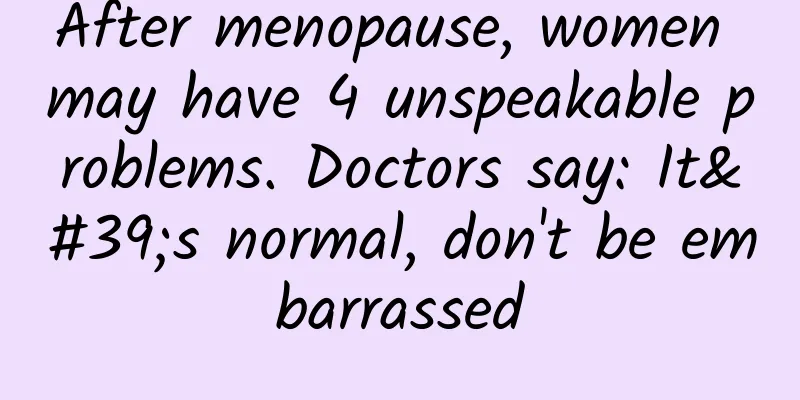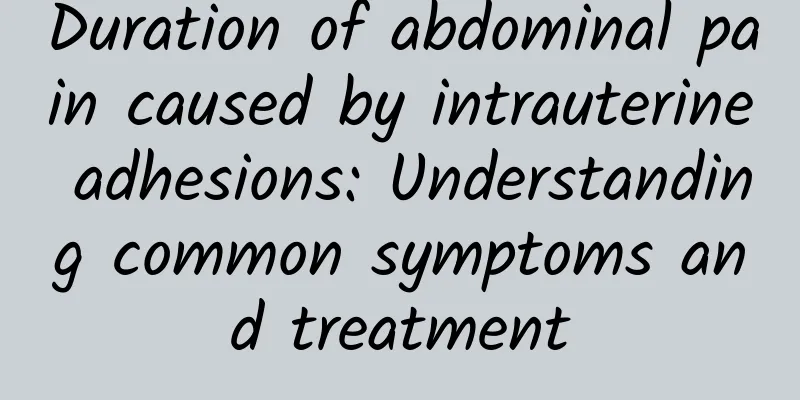After menopause, women may have 4 unspeakable problems. Doctors say: It's normal, don't be embarrassed

|
Menopause, like a "small turning point" in life, brings some embarrassing troubles. But don't worry, let's talk about Aunt Zhang's "menopause" experience today! Aunt Zhang is one of my patients, 53 years old, and has just entered menopause. Aunt Zhang's "hot" night Aunt Zhang has always been hit by a heat wave at night recently, and she sweats profusely in an instant, and even the sheets are soaked. She thought she was "hot-tempered", but in fact it was the hot flashes that were causing the trouble. I told Aunt Zhang: Hot flashes and night sweats are one of the common symptoms after menopause, usually manifested as sudden fever and sweating. This is caused by a drop in estrogen levels, and the symptoms can be relieved by adjusting diet, increasing exercise and relaxing the mood. The problem of moisture in the "secret garden" Aunt Zhang also found that when she was intimate with her husband, the "secret garden" of her body was no longer so moist. I smiled and said: This is because as estrogen levels decrease, the vaginal mucosa becomes thinner, vaginal secretions decrease, and vaginal dryness and pain during sexual intercourse are more likely to occur. This condition is common in postmenopausal women and I suggest it can be treated with the use of lubricants or oral estrogen. A little episode about peeing Aunt Zhang was fine during the day, but at night she had to get up frequently, and sometimes even had to urinate urgently. I explained, "It's not your bladder playing tricks on you. It could be that the urethral mucosa has become thinner. Drink plenty of fluids, maintain hygiene, and if necessary, we can adjust medications to help the bladder find its rhythm again.” Emotional roller coaster Aunt Zhang's emotions were like a roller coaster, sometimes the sky was clear and sunny, and sometimes it was covered with dark clouds. I comforted her, “Your hormones fluctuate, and your emotions fluctuate as well. It’s not your fault. Try yoga, meditation, or chatting with a friend to brighten your mood like a sunny day.” Aunt Zhang felt very reassured after listening to my advice. She decided to be proactive about her symptoms and try my advice. Soon, she noticed a significant improvement in her symptoms and her quality of life improved. After menopause, women may experience a series of emotional problems such as mood swings, irritability, anxiety, depression, etc. due to drastic changes in hormone levels in the body, especially the decrease in estrogen. These emotional issues not only affect quality of life, but can also have a negative impact on physical and mental health. So, in addition to the above, what other ways are there to deal with mood swings in women after menopause? Here are some coping strategies to help you get through this period. 1. Regularly assess your mental state Regularly screen and assess mental health issues to facilitate early identification, diagnosis, and intervention to reduce the occurrence of serious mental illnesses. 2. Exercise moderately According to your own health condition, you can do moderate exercise, such as slow walking, brisk walking, jogging, square dancing, Tai Chi, etc. These can help relieve emotional fluctuations. 3. Regular diet and daily routine A regular life is very important for mental peace and happiness. The diet of menopausal women should be mainly low-fat, low-sugar, low-calorie foods, and they should appropriately increase their dietary fiber intake and vitamin supplements. 4. Family support Family members should be considerate of each other, train relevant communication skills, and establish a good family support system to alleviate the negative emotions of menopausal women. 5. Live life to the fullest Cultivate hobbies, such as raising fish, raising flowers, dancing, listening to music, etc., to add interest to life, communicate more with friends, and support each other. 6. Mental health education and consultation Carry out mental health education on problems such as anxiety, depression, and insomnia to enable menopausal women to understand relevant psychological knowledge and prevent problems before they occur. If necessary, professional psychotherapy and counseling services can be provided. 7. Medication For women with more serious psychological problems, drug treatment should be considered in a timely manner, such as antidepressants, menopausal hormone therapy, etc., and the choice should be made after evaluation by relevant specialists. By following these tips, you can better manage your postmenopausal mood swings, improve your quality of life, and maintain a healthy mental state. If you find yourself having difficulty coping with these emotional issues, seek professional medical help. Menopausal women should focus on a balanced diet, especially considering that the body's need for estrogen may change. So, what should menopausal women eat to relieve menstrual discomfort? Here are some types of foods that are good for women during menopause: Donkey-hide gelatin: Donkey-hide gelatin is considered a traditional blood tonic and is very valuable for women. It can not only nourish blood and moisten dryness, improve anemia, but also regulate endocrine, provide deep nourishment for the ovaries, help maintain their vitality, and delay aging. Longan: Longan is rich in nutrients, such as glucose, protein, vitamins, etc. It can nourish qi and blood, calm the nerves and stabilize the mind, help promote blood circulation, enhance immunity, warm the uterus, and provide necessary nutrients for the ovaries. Black wolfberry: Black wolfberry is famous for its effects on nourishing the kidney and essence, improving eyesight and nourishing the liver. It is rich in antioxidants such as anthocyanins and vitamin C, which can effectively fight free radicals and delay aging. Reduce the intake of foods high in cholesterol, such as fish roe, chicken skin, duck skin, etc., and reduce the intake of foods containing caffeine, such as coffee, alcohol, etc. It should be noted that everyone has different physiques and needs, so it is best to consult a doctor or nutritionist before adjusting your diet to ensure that it is in line with your personal health. Aunt Zhang, and all friends who encounter similar problems, remember that these troubles are common in postmenopausal women. Don't be shy, don't be afraid, bravely share your little secrets with your doctor, and we will find a solution together. Life goes on, and we have to enjoy this new stage gracefully, right? So, dear, if you also have these "little secrets", don't forget that you are not fighting alone, I am always here to accompany you to smile at life! |
Recommend
Nutritional weight loss is the best way! There is a secret to not gaining weight again
The biggest enemy of people who eat out is obesit...
Can I get pregnant if I have ovarian cysts on both sides? What are the symptoms?
Left ovarian cyst refers to a cystic mass in the ...
Will cervical erosion recur after treatment with Lipu Knife? Advantages of Lipu Knife in treating cervical erosion
The harm caused by cervical erosion to female fri...
What to eat after uterine fibroid surgery Dietary care methods after uterine fibroid surgery
The incidence of uterine fibroids is gradually in...
What are the causes of ectopic pregnancy?
What are the causes of ectopic pregnancy? Ectopic...
What are the nursing care for acute pelvic peritonitis
Many women suffer from pelvic peritonitis, which ...
Key points for diagnosis of lactational amenorrhea syndrome
Lactational amenorrhea syndrome is generally divi...
Tell you how to treat cervical cysts
Cervical cyst is a type of chronic cervicitis. Wo...
Ovarian cysts are likely to be related to endocrine factors
Ovarian cysts are very likely to be related to en...
How much does it cost to treat cervical erosion?
Nowadays, the technology for treating cervical er...
How to treat patients with cervical erosion and cysts? The most effective methods for treating cervical erosion
Female patients with cervical erosion often face ...
How to check for pelvic inflammatory disease
How to check for pelvic inflammatory disease? Pel...
What is the best way to treat pelvic effusion?
There is no best treatment for pelvic effusion. T...
Treatment of multiple uterine fibroids How to use medication for multiple uterine fibroids
Due to the high incidence of multiple uterine fib...
How much does it cost to check gynecological diseases? What should be paid attention to before checking gynecological diseases?
Issues regarding gynecological examinations appea...









